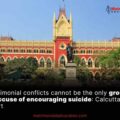
The Delhi High Court declared that engaging in a suicide attempt and then blaming the husband and his family amounts to a grave act of cruelty, as stated on Tuesday. Justice Suresh Kumar Kait, leading the court, underscored that such conduct exposes the family to constant risks of unfounded accusations. The Supreme Court has previously affirmed that recurring suicide threats or attempts are forms of cruelty. The high court affirmed a family court’s decision to grant divorce to a man based on cruelty by his wife.
Justice Neena Bansal Krishna, also part of the bench, observed that the couple’s marriage faced persistent troubles. The wife, in an attempt to take her own life, consumed a mosquito repellent liquid. However, she later tried to avoid responsibility by claiming she was coerced into taking such drastic measures.
The court took note of the wife’s assertion that a lack of proper diet led her husband to administer the liquid under the guise of a nutritious tonic. Nevertheless, she later admitted that her husband was at his workplace during the incident.
“Such conduct of the appellant in attempting suicide and then trying to put the blame on the husband and his family members was an act of extreme cruelty as the family remained under the constant threat of being implicated in false cases,” the court said.
“The repeated threats to commit suicide and an attempt to commit suicide were held to be an action amounting to cruelty by the Supreme court…. (In another case,) it was observed (by the top court) that in case the wife succeeds in committing suicide, one can only imagine how the poor husband would get entangled into the clutches of law, which would virtually ruin his sanity, peace of mind, career and probably his entire life. Such a threat of attempting suicide amounts to cruelty,” the court added.
Furthermore, the court emphasized that while the wife has a legal right to seek remedy for any wrongdoing, making baseless allegations of dowry demands or acts of cruelty against the husband or his family and initiating criminal proceedings against them are clearly regarded as acts of cruelty.
“We note that during the two years of their matrimonial life, the parties barely resided together for 10 months in all and even during that time, there were various acts of cruelty of being subjected to false complaints and civil as well as criminal litigation committed by the appellant (wife) towards the respondent,” the court said.
“We, therefore, conclude that the learned additional principal judge of the family court has rightly held that the respondent was subjected to cruelty by the appellant and granted divorce under section 13(1)(ia) of the HMA (Hindu Marriage Act). We find no merit in the appeal, which along with the pending applications, if any, is hereby dismissed,” the court ordered.





